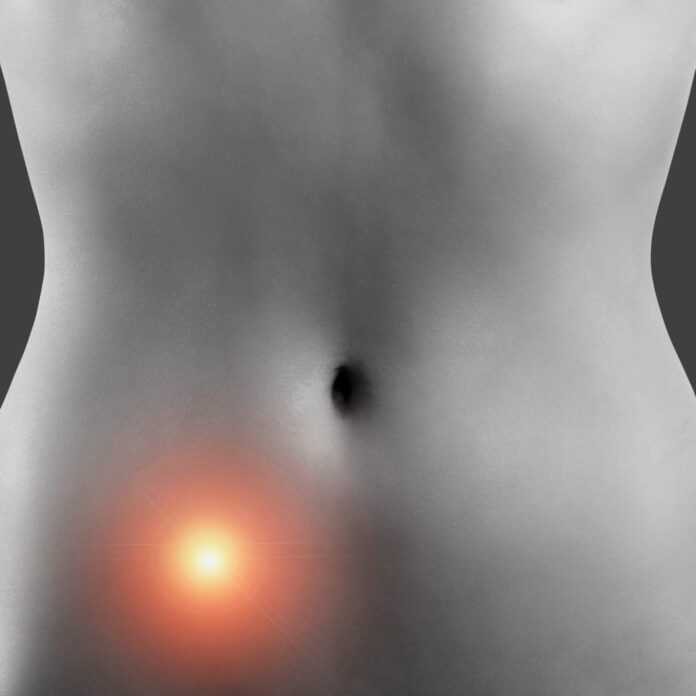A new genetic study offers an alternative therapeutic option for treating painful endometriosis without surgery or hormones.
“This is an exciting new development in our quest for new treatments of endometriosis, a debilitating and underrecognized disease affecting 190 million women worldwide. We have a promising new non-hormonal target for further investigation and development that appears to address directly the inflammatory and pain components of the disease,” says Krina Zondervan, PhD, chair of the department of women’s and reproductive health, professor of reproductive and genomic epidemiology, co-director of the Endometriosis CaRe Centre at Oxford and corresponding author on the study.
The endometrium is the inner lining of the uterine wall that builds up and sheds periodically during the reproductive lifespan in women. In women suffering from endometriosis, endometrium-like tissue grows outside the uterus leading to inflammation, intense abdominal pain usually associated with menstrual periods, and infertility.
Although the molecular causes of endometriosis are not known, heritability is estimated at about 50% indicating a strong genetic component. Current treatment options are hormone therapy and surgery with a dire need for non-hormonal therapeutics.
Scientists at Baylor College of Medicine, the University of Oxford, the University of Wisconsin-Madison and Bayer AG, have conducted genetic analyses on humans and rhesus macaques—two species that spontaneously develop endometriosis—to uncover that the gene NPSR1 (neuropeptide S receptor 1) is associated with disease.
Toward establishing therapeutic efficacy, the authors inhibit NPSR1 in mouse models using the small molecular inhibitor SHA 68R and show this reduces the abnormal infiltration of endometrial tissue outside the uterus and into the peritoneum—the membrane that envelops all organs in the abdomen—reducing inflammation, endometriosis, and pain.
These findings are published in an article in the journal Science Translational Medicine, titled “Neuropeptide S receptor 1 is a nonhormonal treatment target in endometriosis.” If corroborated in nonhuman primate and human trials, this may lead to a nonhormonal drug for endometriosis.
The researchers sequence DNA from 32 human families contributing to a genetic linkage signal on the short arm of chromosome seven and find an abundance of potentially deleterious low-frequency coding variants in NPSR1 in individuals with stage III/IV endometriosis versus normal individuals. The authors see a similar linkage in a genetic study on 849 rhesus macaques.

The Oxford team, led by Zondervan, had previously found a genetic linkage to endometriosis on the short arm of chromosome 7 by analyzing DNA from families containing at least three women suffering from endometriosis. The Baylor team, led by senior author Jeffrey Rogers, PhD, associate professor at the Human Genome Sequencing Center at Baylor, verified this genetic linkage in the DNA of rhesus monkeys at the Wisconsin National Primate Research Center at the University of Wisconsin-Madison.
“This is one of the first examples of DNA sequencing in nonhuman primates to validate results in human studies and the first to make a significant impact on understanding the genetics of common, complex metabolic diseases,” says Rogers. “The primate research really helped to provide confidence at each step of the genetic analysis in humans and gave us the motivation to carry on chasing these particular genes.”

Through a comparative study in 3194 surgically confirmed, unrelated patients and 7060 normal subjects, the authors reveal a common insertion/deletion variant encompassing NPSR1 that is strongly associated with stage III/IV endometriosis.
The authors conduct immunohistochemistry, qRT-PCR, and flow cytometry experiments to ascertain NPSR1 is expressed in glandular epithelial tissue in the normal endometrium and in ectopic, aberrant endometrium-like tissue in the peritoneal sac, as well as in monocytes in peritoneal fluid.
Through in vitro molecular analyses, the authors show, the NPSR1 inhibitor SHA 68R blocks NPSR1-mediated signaling, proinflammatory TNF-α release, and monocyte chemotaxis. This translates into reduced inflammatory cell infiltration and abdominal pain in a mouse model of peritoneal inflammation as well as in a mouse model of endometriosis.
The authors note, “The NPSR1/NPS system is a genetically validated, nonhormonal target for the treatment of endometriosis with likely increased relevance to stage III/IV disease.”
Zondervan says they will be conducting further research on the mechanism of action and the role of the genetic variants in the modulation of the gene’s effects in specific tissues.


